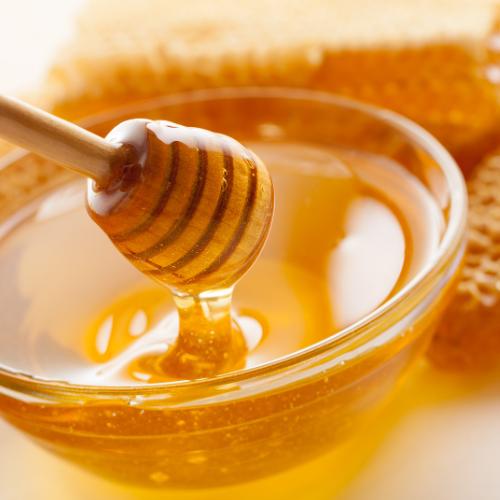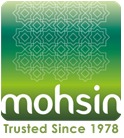Need help? Call us:
+44 116 273 8614
The Wonders of Honey

What is Honey?
The beauty of honey is that it is natural, safe, delicious to use and available all the year round. There are hundreds of studies all over the world confirming the usefulness of honey as a food and medicine. Honey (botanical Name: Mel, Arabic Name: Asal) is produced by bees called Apis (honeybees). It can be found in its standard amber state but may also be red, brown, and even nearly black.
How is Honey made?
The bees collect nectar from local flowers into its mouth. Enzymes in the bee saliva then create a chemical reaction that turns this nectar into honey, which is deposited into the walls of the hive. Incredibly rapid movement of the bees’ wings aerates the honey, which decrease the water content and makes it ready to eat.
Nutritional Benefits of Honey:
The three main components of honey are:
- Bee pollen is often referred to as “natures’ most perfect food” because it is a complete protein:
- All eight essential amino acids
- Vitamins, vitamin C, carotenes, minerals, DNA and RNA,
- Numerous flavonoid molecules and plant hormones.
- Darker honey is a rich source of phenolic compounds, such as flavonoids, that exert significant antioxidant activity.
- Propolis; a sticky substance that bees make which is better known as “bee glue”. The process begins when an expert Propolis-making bee gathers resin from cone-producing evergreen trees or from the buds of trees.
- Rich in Vitamin B-complex, C and E and pro-vitamin A
- Royal Jelly is part of a honey bee product and only fed to the Queen bee. Although royal jelly is very expensive, it has some very good properties. Apart from helping to cure many diseases, it maintains youthful looks and beauty.
- Royal Jelly is made up of 60-70% water, 12% protein, 12-15 carbohydrates and 5-6 % lipid. It also has vitamin B1, vitamin B2, vitamin B6, niacin, pantothenic acid, folic acid and trace amounts of vitamin C. (http://www.herbwisdom.com/herb-royal-jelly.html)
Historical Content of Honey:
The use of honey bee products in the maintenance and promotion of good looks and beauty, particularly women’s beauty, dates back to early civilisation.
The earliest written records of honey used as medicine was in Sumerian clay tablets dated from 1900 to 1250 B.C and in one of these, honey was used in 30% of the prescriptions.
Ancient Egyptians also used honey as a medicine, the most common usage of the time being to make salves or ointments for treating diseases of the eyes and skin. Many well-known historical personalities such as the Queen of Sheba (Malikah Sabaa) used honey bee products in her beauty routine.
Greeks apparently used honey to prevent fatigue: athletes were often given a mixture of honey and water before major athletic events. It has been reported that Hippocrates was a great believer in honey. He considered it a very good cough expectorant, it being able to bring up phlegm from the lungs.
Similarly, honey has been documented as being used as a medicine throughout Europe, as well as through areas of Arabia and China. In these cultures, honey was generally used as a remedy for gastric and intestinal complaints. (Healing Honey: A natural remedy for better health & wellness, Lynne Chepulis, page 30-31).
Religious studies on Honey:
In the Bible:
My son, eat honey, for it is good, and the drippings of the honeycomb are sweet to your taste. (Proverbs 24:13)
In the Quran:
Rivers of purified honey, in which they will have from all [kinds of] fruits and forgiveness from their Lord (Surat Muhammad 47:15)
In the Torah:
“A land flowing with milk and honey” (Exodus. 3: 17)
Unique Properties & Recommendations:
- Honey as Children’s Tonic
- One teaspoon of honey diluted in water two or three times before or after meals improves appetite, weight, complexion and energy.
- For school children honey helps to improve their mental alertness, for this purpose honey can be used instead of jam on toast and breakfast times.
- Bed-wetting
- One to two teaspoons of honey before going to bed helps clear bed wetting. No liquids should be given to children before a child’s bed time
- Constipation
- Honey is mild and gentle laxative which helps to prevent and get rid of constipation.
- Coughs & Colds
- Pour teaspoon of honey in glass/mug of hot water and add ¼ teaspoon of cinnamon powder, mix and drink this mixture warm before meals 3 times a day
- Diarrhoea & Stomach upsets
- A teaspoon of honey in 8oz of barley water will help stop most cases of diarrhoea.
- Accidents, Cuts & Burns
- Honey is a natural anti-septic and can be applied externally as dressing on minor burns, bruises and cuts that happen in most homes.
- Sleep Problems
- One teaspoon of honey in warm milk at evening or night is a naturally soothing and promotes sleep
- Honey as Hair Tonic
- Take 4oz of pure liquid honey and mix with 2oz of pure olive oil. Store away in place such as an airing cupboard. Before washing, shake the bottle well (as the mixture separates) and massage into hair and scalp and leave for 20-30 minutes. Then rinse well in good shampoo. This hair tonic used once a week will help to maintain good lustre of the hair
- Honey Facial
- Take 3 teaspoon of pure liquid honey and third cup of finely ground oatmeal and add 1 teaspoon of rose water and blend well. Spread the facial evenly over the face after having first cleaned it with water. Relax with the preparation for half an hour and carefully remove with soft face cloth in warm water. Then rinse in cold water. Use of this honey facial once a week will help maintain clear and soft complexion. This facial is suitable for all skin types and for all ages.
- Natural Moisturiser
- Stiffly beaten egg white mixed with honey is very good for oily skin.
- For dry skin add touch of milk cream to honey.
- To relieve fatigue, add a spoon of honey to your bath water.
Disclaimer:
This information is provided for education and information purposes only. Please consult your healthcare professional for personal advice.
© 2009 by M. Salim Khan M.D. (M.A.) M.H. D.O.
Consultant Herbalist, Nutritionist and Iridoligist Mohsin Health
Founder and Principal of The College of Medicine and Healing Arts
www.mohsinhealth.com
www.comha.org.uk


